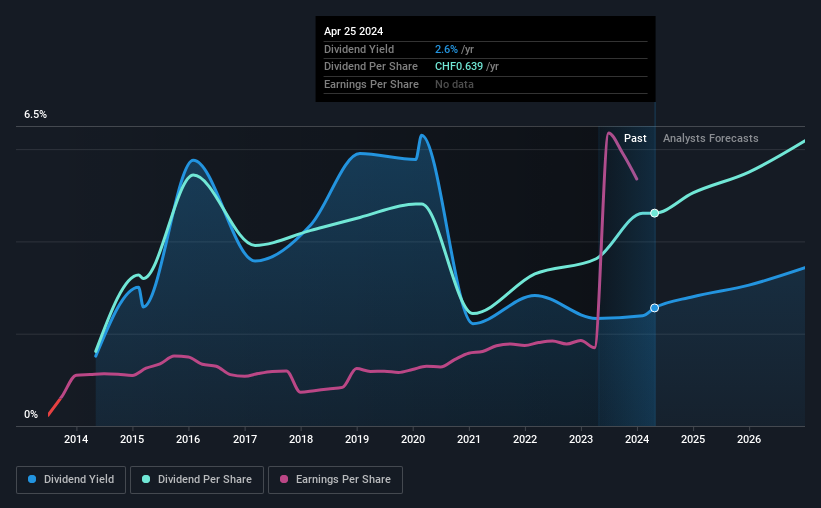Be Sure To Check Out UBS Group AG (VTX:UBSG) Before It Goes Ex-Dividend
Regular readers will know that we love our dividends at Simply Wall St, which is why it's exciting to see UBS Group AG (VTX:UBSG) is about to trade ex-dividend in the next three days. The ex-dividend date occurs one day before the record date which is the day on which shareholders need to be on the company's books in order to receive a dividend. The ex-dividend date is important as the process of settlement involves two full business days. So if you miss that date, you would not show up on the company's books on the record date. Meaning, you will need to purchase UBS Group's shares before the 30th of April to receive the dividend, which will be paid on the 3rd of May.
The company's upcoming dividend is US$0.70 a share, following on from the last 12 months, when the company distributed a total of US$0.70 per share to shareholders. Based on the last year's worth of payments, UBS Group stock has a trailing yield of around 2.6% on the current share price of CHF024.96. Dividends are a major contributor to investment returns for long term holders, but only if the dividend continues to be paid. That's why we should always check whether the dividend payments appear sustainable, and if the company is growing.
View our latest analysis for UBS Group
Dividends are typically paid out of company income, so if a company pays out more than it earned, its dividend is usually at a higher risk of being cut. UBS Group paid out just 7.9% of its profit last year, which we think is conservatively low and leaves plenty of margin for unexpected circumstances.
When a company paid out less in dividends than it earned in profit, this generally suggests its dividend is affordable. The lower the % of its profit that it pays out, the greater the margin of safety for the dividend if the business enters a downturn.
Click here to see the company's payout ratio, plus analyst estimates of its future dividends.
Have Earnings And Dividends Been Growing?
Businesses with strong growth prospects usually make the best dividend payers, because it's easier to grow dividends when earnings per share are improving. Investors love dividends, so if earnings fall and the dividend is reduced, expect a stock to be sold off heavily at the same time. That's why it's comforting to see UBS Group's earnings have been skyrocketing, up 48% per annum for the past five years.
The main way most investors will assess a company's dividend prospects is by checking the historical rate of dividend growth. UBS Group has delivered 11% dividend growth per year on average over the past 10 years. Both per-share earnings and dividends have both been growing rapidly in recent times, which is great to see.
The Bottom Line
From a dividend perspective, should investors buy or avoid UBS Group? Typically, companies that are growing rapidly and paying out a low fraction of earnings are keeping the profits for reinvestment in the business. This strategy can add significant value to shareholders over the long term - as long as it's done without issuing too many new shares. UBS Group ticks a lot of boxes for us from a dividend perspective, and we think these characteristics should mark the company as deserving of further attention.
With that in mind, a critical part of thorough stock research is being aware of any risks that stock currently faces. We've identified 4 warning signs with UBS Group (at least 1 which is a bit concerning), and understanding these should be part of your investment process.
If you're in the market for strong dividend payers, we recommend checking our selection of top dividend stocks.
Have feedback on this article? Concerned about the content? Get in touch with us directly. Alternatively, email editorial-team (at) simplywallst.com.
This article by Simply Wall St is general in nature. We provide commentary based on historical data and analyst forecasts only using an unbiased methodology and our articles are not intended to be financial advice. It does not constitute a recommendation to buy or sell any stock, and does not take account of your objectives, or your financial situation. We aim to bring you long-term focused analysis driven by fundamental data. Note that our analysis may not factor in the latest price-sensitive company announcements or qualitative material. Simply Wall St has no position in any stocks mentioned.

